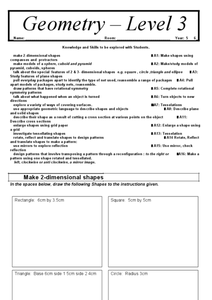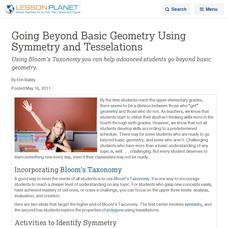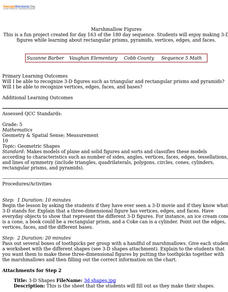Curated OER
Mathematics in Art?
Fifth graders view prints of M.C. Escher's work. They look at examples of geometric figures and polygons and discuss places they have seen them. Students create their own tessellations. They write a report about the process they used in...
Curated OER
Five E Lesson Plans For Math
Students use the Five E method to solve problems. In this Five E lesson, students complete math lessons using the Engage, Explore, Explain, Elaborate, and Evaluate technique. They use the Five E's with lessons on tessellations, magnets,...
Curated OER
Fold and Cut
Second graders explore line symmetry and the names and attributes of two-dimensional mathematical shapes. They study the context by folding and cutting out shapes to make a series of mathematical shapes.
Curated OER
Let's Tesselate
Students investigate the geometrical concepts of translation, reflection, and rotation. They make different observations looking for the concepts that are displayed in classroom items like floor tiles, carpet designs, and visuals hung in...
Creative Educator
Tessellation Sensation
Geometers investigate patterns and symmetry, and examine the artwork of M.C. Escher on the Internet. They compare his style to the floor and ceiling tiles in the classroom. If you have ImageBlender™ software, you could have your...
Curated OER
Tessellation Trial and Error
In this interactive lesson, pupils review attributes of equilateral polygons. They are introduced to the concept of a tessellation. Using protractors and pre-cut shapes, students arrange a variety of tiles to create tessellations. They...
Curated OER
Problem Solving: Make a Model Practice
For this problem solving worksheet, students make models to solve 5 word problems, showing their work. Houghton Mifflin text referenced.
National Gallery of Canada
My Upside-Down World!
M.C. Escher is famous for creating optical illusions. Examine this effect in several of his works and discuss the techniques involved. Inspired by the discussion, learners create an imaginary 3-D world inside of a box using various...
Curated OER
Adopt An Insect
This lesson plan combines a creative building activity with analyzing a butterfly photograph and using problem solving to complete the puzzle. It blends art and science very well. Students will learn and enjoy the process. The extension...
Curated OER
Geometry Level 3
What a wonderful resource! Learners create two-dimensional shapes according to the instructions stated, use the squares to make a triangular prism, a cube, and a pyramid, and identify features of plane shapes, among a myriad of other...
Curated OER
Going Beyond Basic Geometry Using Symmetry and Tesselations
Using Bloom's Taxonomy you can help advanced students go beyond basic geometry.
Curated OER
Midwest Hospitality
Students create snowflakes using the ideas of symmetry, perpendicularity, and regularity in this Art lesson that incorporates Mathematical concepts and artistic design. The lesson includes a materials list, vocabulary list, and possible...
Curated OER
Symmetry In Nature
Pupils investigate the symmetry that is found in nature. They view shapes and patterns in nature while looking at images. Students look for tessellations while obtaining photographs with a digital camera. The information is used for...
NTTI
Transform Your Geometry into a Work of Art
Mathematicians utilize artwork to help illustrate the major ideas of transformations and tessellations. They visually identify transformations including reflections, rotations, and translations. They discuss how artists have used...
Curated OER
Figure This! Math Challenges for Families
Young mathematicians complete a family math challenge packet. They will complete a packet of mixed math activities. They work with graphs, comparing numerical data, tessellations, and probability.
Curated OER
Marshmallow Figures
Young scholars enjoy making 3-D figures while learning about rectangular prisms, pyramids, vertices, edges, and faces. After a lecture/demo, students use marshmallows, toothpicks and a worksheet imbedded in this lesson to create 3...
Curated OER
Mathematics Within: Shape, Space & Measurement
Students experiment and analyze triangulation to assess degrees of combined angles, predict polygons that tessellate as well as extending of shapes to create tessellations. They explore the concept of why some polygons tessellate when...
Curated OER
Biology Tessellations
Learners review three types of polygons that are triangles, squares, and hexagons. They use a computer program to draw various types of tessellations. The students use the drawing of a honeybee as inspiration.
Curated OER
Fold and Cut 2
Second graders make, name, and describe, using their own language and the language of geometry, everyday shapes and objects. They create and discuss geometric patterns which repeat (show translation), or which have rotational or...
Curated OER
The Geometry of Indigenous Art
Students examine the concepts of symmetry, rotations, reflections, translation, dialations, and tessellations and apply them to indigenous art. They also do Internet research and create artwork (painting, pottery, computer graphic design).
Curated OER
Math is Beautiful: Tessellation
Students examine patterning in Chinese and Japanese artwork prior to creating their
own tessellations using styrofoam plates in this creative cross-curricular lesson for upper-elementary/middle level classrooms.
Curated OER
Geometry in Tessellations
Students examine tessellations and their geometric properties. Students also develop a better understanding of lines, planes, angles, and polygons.
Curated OER
Piece by Piece
Put an insect together piece by piece with a fun and artistic puzzle project. To increase small group collaboration, learners use photos of insects cut into one-inch squares to create an enlarged puzzle version of the image. Extension...
Curated OER
A Honey of a Hexagon
Learners explore how bees make honey and why the hexagon is the best basic pattern for the honeycomb through the use of a video and hands-on activities with honeycombs and geometric shapes.

























